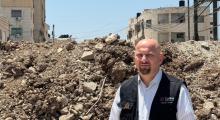Issued by the Catholic Center for Studies and Media - Jordan. Editor-in-chief Fr. Rif'at Bader - موقع أبونا abouna.org

Caritas Jerusalem: ‘Needs are immense’ in Gaza and West Bank
Caritas Jerusalem has teams on the ground in Gaza and the West Bank to continue their life-saving humanitarian work among those who have lost everything.
Despite the Iranian missile strikes on Israel, the Catholic organization continues its mission in a dangerous and alarming context, according to Anton Asfar, Director of Caritas Jerusalem.
Following the Israeli strikes that began on Iran on Friday, June 13, the Church’s aid agency suspended its activities to assess the risks of continuing its humanitarian efforts in this new context of open war.
Yet, faced with the “immense needs,” Mr. Asfar organized the resumption of operations as early as the following day. “We are on the front lines to provide aid to the population, and as a major organization and the social arm of the Church, we had to continue our work.”
Shortage of medicines
In the Gaza Strip, Caritas Jerusalem has deployed 122 team members across ten medical units to provide emergency aid.
They carry out their work under bombardment, with daily deaths, especially in the north.
“The situation is catastrophic,” said Mr. Asfar, citing the acute shortage of medicines, food, and even drinking water. “We brought as much medicine and medical supplies as we could during the recent ceasefire, but now our supplies are running out.”
He said teams sometimes receive medications from the World Health Organization or other partners.
In the Gaza Strip, Mr. Asfar described heart-breaking scenes of daily life, including barefoot children rummaging through garbage for food scraps, mosquitoes spreading infectious diseases, and food distributions from the Gaza Humanitarian Foundation turning into bloodbaths.
An unrelenting deluge of bombs
Within the Holy Family Catholic Parish of Gaza, Christians are also suffering from a slow and progressive asphyxiation, where bombings continue apace.
Caritas Jerusalem is in close contact with Father Gabriel Romanelli, pastor of the only Catholic parish in Gaza, whenever it is possible to reach him. Recently, the priest had to climb onto the roof of his church to get cell signal.
The director of Caritas Jerusalem said having teams on the ground is a constant source of anxiety.
“We continue to evaluate the situation because we do not want to put our teams at risk,” he said. “It is very dangerous to operate in Gaza, which has become a true lawless zone.”
‘The West Bank is paralyzed’
Caritas Jerusalem is also raising the alarm about the dire situation in the West Bank.
Returning from a recent visit to the north, Mr. Asfar observed the construction of new walls and new settlements.
“I saw significant changes on the ground,” he noted, pointing to the village of Sinjil, 50 kilometers north of Jerusalem, now surrounded by barbed wire fences several meters high.
“The West Bank is paralyzed, there is very little freedom of movement,” continued Mr. Asfar, who counted no fewer than 900 checkpoints or barriers throughout the West Bank.
Agriculture, education, and the entire economy are severely suffering from these restrictions, which come on top of an already difficult context.
With the halt of pilgrimages to the Holy Land, many cities like Bethlehem have come to a standstill.
Nearly 200,000 workers are unemployed in the West Bank, estimates Caritas Jerusalem, which is trying to stimulate the economy by providing seeds to those venturing into agriculture or by offering micro-grants for various entrepreneurial projects, such as sewing or cooking activities.
Over 40,000 internally displaced people
Caritas Jerusalem is also working with the 40,000 refugees living in the camps of Jenin, Nur Shams, and Tulkarem.
“These internally displaced people have nothing,” said Mr. Asfar. “They need food, hygiene kits, dignity kits… We are doing our best to help them, and we will launch medical days and psychosocial support programs in the north of the West Bank.”
The Director of Caritas Jerusalem said he and his team refuse to give up, calling for international efforts to end the war.
Mr. Asfar said he relies above all on his faith to maintain hope for better days.
“We are trying to replant hope within the community so that it becomes more resilient,” he concluded, saying he is encouraged by the support of partners from around the world.







